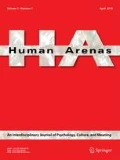Abstract
The hypothesis of the following essay is that any relationship, even a friendship, is asymmetric. At the beginning of the essay, I will analyse asymmetry as the basis of any exchange. Where surplus and subtraction are viewed as interactions’ continuous plateaux. I will focus on surplus and subtraction as a way of local strategizing with no general Strategy. Homer’s Ulysses is the paradigm of subtraction (Metis) while Shakespeare’s Portia the one of surplus (Mercy). As Marcel Mauss (1990), Georges Bataille (1976) and other authors claim: the gift is never free. Subtractions and surplus are always constitutive parts of the exchange, even though the surplus is not always exploitation (as seen with Portia) and the subtraction is not always submission (as in Ulysses). This implies that the rational exchange, in which I sell you something and you buy something from me—providing an adequate quantity of goods, money, or else—is utopic and ideological. The aim of the essay is to support a trans-disciplinary investigation concerning the exchange and to approach asymmetry from different scientific and literary perspectives, an essay on what Gilles Deleuze (1997) called “critical and clinical”. So literary critics and clinical approach are mingled, both of them belong to “life as we know it” (Bérubé 1998).
Similar content being viewed by others
Notes
These lessons have been held in 1986 and published in Italian and Spanish recently. I have no news about any English version of it. Even in French, I saw the lessons online, but no text found.
From here comes the deep influence of Lévi-Strauss on Lacan
See also Foucault (1976).
Mariaelena Bartesaghi is one of the most important researchers in discourse and conversational analysis; the circumstances I mentioned above are referring to a seminar on analysis of conversation of Family Therapy.
Metis is not just the virtue of prudence, it is also the virtue of providence; we can call it also the art of subtraction, because any virtue requires an art; a Virtuoso posses the Techne.
The Gift has been written by Marcel Mauss in 1925. La part maudite and the fragments titled La limite de l’utile (both in Volume 7 of the Complete Works in French) were written by Georges Bataille during the 1830s of the 19th Century.
Horkheimer & Adorno’s Dialectic of Enlightenment was published in 1947 in the Netherlands.
See also the disussion between Derrida and Jean-Luc Marion in Caputo & Scanlon (1999).
To know the terms of the controversy between Jay Haley and Gregory Bateson, see Sluzki and Ransom 1976
See also Bateson (2002)
References
Anderson, H. (1997). Conversation, language and possibilities. New York: Basic Books.
Barbetta, P. (2018). Locura y creacion. Gedisa: Barcelona.
Bartesaghi, M. (2009a). How the therapist does authority: six strategies to substitute client accounts in the session. Communication & Medicine, 6, 15–25.
Bartesaghi, M. (2009b). Conversation and psychotherapy: how questioning reveals institutional answers. Discourse Studies, 11, 153–178.
Bataille, G. (1976). Oeuvres Completes: vol 7. Paris: Gallimard.
Bataille, G. (1945). Sur Nietzsche (volonte de chance). Paris: Gallimard.
Bateson, G. (1958) Naven, San Francisco, Stanford University Press.
Bateson, G. (1972a) Bali: the value system of a steady state. Ethos and Schismogenesis, Bateson, G. Steps to an Ecology of Mind, London, Jason Aronson.
Bateson. (1972b). The value system of a steady state. In Steps to an ecology of mind. London: Aronson.
Bateson, G. (2002). Mind and nature: a necessary unity. New York: Hampton Press.
Bateson, G., & Mead, M. (1942). Balinese character. In A photographic analysis. New York: Academy of Science.
Bérubé, M. (1998). Life as we know it: a father, a family and an exceptional child. London: Vintage.
Caputo, J.D., Scanlon, M.J (Eds.) (1999) God, the gift and postmodernism, Bloomington and Indianapolis, Indiana University Press.
Clausewitz, v. C. (2008). On war. Princeton: Princeton University Press.
Deleuze, G. (1962). Nietzsche et la philosophie. Paris: PUF.
Deleuze, G. (1997). Essays critical and clinic. Minneapolis: The University of Minnesota Press.
Deleuze, G. (2018). Il potere: Corso su Michel Foucault (1985–86) (Vol. 2). Ombre Corte: Verona.
Deleuze and Guattari. (1983). A thousand plateaux. Minneapolis: The University of Minnesota Press.
Derrida, J. (1999). Donner la mort. Paris: Galilée.
Derrida, J. (2004) Pardonner: l’impardonnable et l’imperscrptible, Paris, Editon de l’Herne.
Derrida, J. (2006). The politics of friendship. New York: Verso.
Foerster, v., H. (1982). Observing systems. New York: Intersystems Pulications.
Foucault, M. (1971). Nietzsche, la généalogie, l’histoire. In Hommage à Jean Hyppolite. Paris: P.U.F.
Foucault, M. (1976). La volonté de savoir. Paris: Gallimard.
Foucault, M. (1990). The Care of the Self. New Yourk: Penguin.
Foucault, M. (2001). The government of self and the other. London: Picador.
Horkheimer, M., Adorno, T. (2002) Dialectic of Enlightenment, Redwood City (Ca), Stanford University Press.
Leach, E. (1961). Rethinking anthropology. New York: Robert Cunningham & Son.
Lévi-Strauss, C. (1966). The elementary structure of kinship. Boston: Beacon.
Luccarelli, V. (2018) Hu Arenas https://doi.org/10.1007/s42087-018-0016-8
Manning, E. (2016). The minor gesture. New York: Duke University Press.
Marx, K. (2016). Das Kapital. Nikol: Hamburg.
Mauss, M. (1990). The gift. London: Routledge.
Nietzsche, F. (1994). The birth of tragedy. New York: Penguin.
Nietzsche, F. (2009). On the genealogy of morals. London: Oxford University Press.
Schmitt, C. (2007). The concept of the political. Chicago: The University of Chicago Press.
Sluzki, C. E., & Ransom, E. (1976). Double bind: the foundation of communicational approach to the family. New York: Psycological Corp.
Spinoza, B. (1677 KindleVersion), Ethica. English, Publish Dominion Book.
Tomm, K. (1987a). Interventive interviewing: part I. Family Process, 26(1), 3–13.
Tomm, K. (1987b). Interventive interviewing: part II. Family Process, 26(1), 167–183.
Tomm, K. (1988). Interventive interviewing: part III. Family Process, 27(1), 1–15.
Tronti, M. (2013) Operai e capitale, Roma, DeriveApprodi.
Visser, M. (2003). Gregory Bateson on deutero-learning and double bind: a brief conceptual history. Journal of History of the Behavioral Sciences, 39(3), 269–278 Summer 2003.




